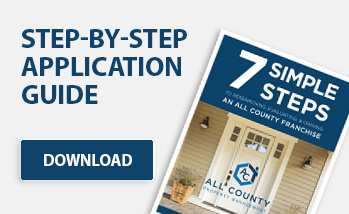How did All County Franchise get started?
How did All County Franchise get Started?
All County Property Management has over 50 offices across the country. But it didn’t start out this way.
Back in 1990 Sandy Ferrera was a single-mom just trying to support her two boys. A few real-estate deals went south and cost her $16,000 in commissions. This is when Sandy knew it was time for a change.
Sandy made the shift from real-estate sales to property management and the rest is history.
Watch the video below and learn how a single-mother with two boys to raise started a national franchise with 50 offices across the country.
Watch the video and check out the transcript below.
And if you want to know more about the All County Franchise Opportunity then I encourage you to download the All County Brochure. It is a good place to start.
Want to get notified the next time we upload videos like the one above? It’s easy, simply subscribe to our YouTube channel.
Video Transcript:
Sandy Ferrera:
One of the things that I get asked frequently is, “How did you get into property management? What attracted you to property management?” Because if you go back 28 years, it wasn’t really a known concept. And I was bread young as an entrepreneur and my first businesses where I used to buy and fix up and then sell coin laundromats, and it was a very lucrative business. The problem was in order to really do well you didn’t always go in the best areas, and for a young lady it probably wasn’t the safest way for me to make a living.
So I moved into what I call traditional real estate which is the buying and selling of properties. I started acquiring my own investment properties and I worked with a number of investors and I found that there was a real need for what we do, and that was managing these assets for these investors. And so as I started to transition that way I realized that the neatest thing about this business was the residual income, it was the regular revenue stream. I mean when I was selling traditional real estate it was dependent on the title company, the mortgage company, all of these start lining up. And property management, once I put the deal together I then just kind of had to babysit it and make sure that things were moving smoothly. And so I got out of traditional real estate, went into property management full time, and I’ve been through pretty much every economic change that you can go through in the real estate cycle after doing this for 28 years.
I love this business, it’s a great residual income if you do it properly and no matter what forest you’re after, if you’re in an economy where things are not going so well, housing is still a basic need. Yes, your rents drop, but your demand rises. And if you’re in an environment where everything is selling off the shelves and there’s not a lot of surplus, well then guess what the housing prices do? Well, they do up.
It really is a neat business model in the aspect that it really doesn’t matter what’s going on, there’s always a demand and there’s always that residual income.
Brandon (Behind Camera):
Yeah, you’re kind of hitting on a basic human need of shelter. We’re always going to be in demand.
Sandy Ferrera:
Yeah, it is. Housing is a basic need. And we really focus on middle America, not your super high end, not your low end, middle America. We want to help the individual that we want to work with, that’s going to make a good relationship longterm. I’ve had a tenant that lived in a property for 14 years. Those are the kind of tenants that are wonderful. Now we have the tenants that may move, only live with us for a year, reside with us for a year because they want to buy a house or they’re moving to another area, and those are great too. But the idea is we go after that personal relationship and I think that sets us apart. Yes, we’re in business to make money, there is no doubt about it, but there is a customer service aspect that we really focus on and we build relationships. We’re building relationships with our franchisees, we’re building relationships with our investors, we’re building relationships with our customers, tenants – who knows, they later become our investors – we build relationships with our realtor partners and our vendors, and we really are in the business of building relationships and longterm commitments.



